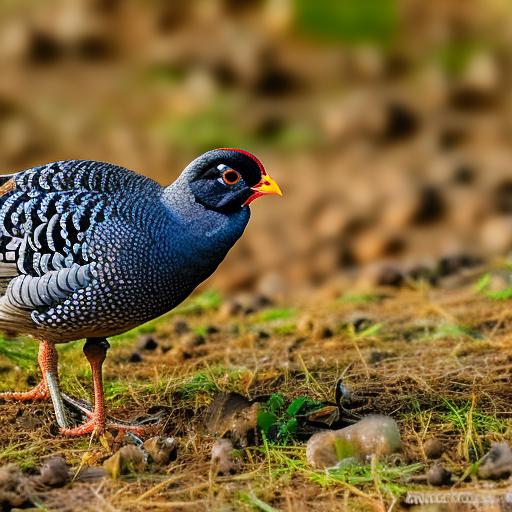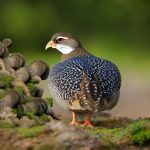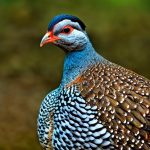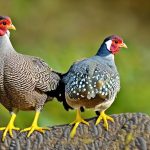Guinea fowl, also known as guinea hens, are domesticated birds that are popular for their pest control abilities and flavorful meat. When considering raising guinea fowl, it’s important to understand their specific needs in order to provide them with a healthy and comfortable environment. Guinea fowl are social birds that thrive in flocks, so it’s best to keep them in groups of at least six to eight birds. They are also highly active and require plenty of space to roam and forage, so a large outdoor area is essential for their well-being. Additionally, guinea fowl are known for their loud calls and can be quite vocal, so it’s important to consider the noise level when planning their housing and location on your property.
Guinea fowl are hardy birds that can tolerate a wide range of temperatures, but they do require protection from extreme weather conditions. Their housing should provide shelter from rain, wind, and direct sunlight, as well as protection from predators. It’s also important to provide them with a secure roosting area for the night, as guinea fowl prefer to sleep off the ground to avoid potential predators. Understanding the natural behaviors and instincts of guinea fowl is crucial for meeting their needs and ensuring their well-being on your farm or property.
Key Takeaways
- Guinea fowl require a safe and secure shelter to protect them from predators and the elements.
- Providing a designated feeding and watering area is essential for the health and well-being of guinea fowl.
- Protecting guinea fowl from predators is crucial to ensuring their safety and survival.
- Regular monitoring of the health of guinea fowl is important for early detection of any potential issues.
- Establishing a dust bathing area is important for the hygiene and well-being of guinea fowl.
Providing Adequate Shelter for Guinea Fowl
When it comes to providing shelter for guinea fowl, there are a few key considerations to keep in mind. First and foremost, the housing should be spacious enough to accommodate the size of the flock and allow for ample room to move around. A good rule of thumb is to provide at least 3-4 square feet of space per bird inside the coop, and even more space in the outdoor run area. The coop should also have good ventilation to prevent moisture buildup and ensure good air quality for the birds. Additionally, it’s important to provide roosting bars or platforms for the guinea fowl to perch on at night, as they prefer to sleep off the ground to feel safe from potential predators.
In terms of materials, the coop should be sturdy and predator-proof, with solid walls and a secure roof to keep out unwanted visitors. It’s also important to provide nesting boxes for the hens to lay their eggs, as well as easy access for egg collection. When designing the housing for guinea fowl, it’s important to consider their natural behaviors and instincts, such as their need for roosting space and protection from predators. By providing adequate shelter that meets these needs, you can ensure that your guinea fowl are comfortable and safe in their environment.
Creating a Safe Feeding and Watering Area
In addition to providing adequate shelter, it’s important to create a safe and accessible feeding and watering area for guinea fowl. Guinea fowl are active foragers that spend much of their day searching for insects, seeds, and other small creatures to eat. It’s important to provide them with access to a variety of natural foods, as well as supplemental feed to ensure they are getting all the nutrients they need. When it comes to feeding guinea fowl, it’s best to offer a balanced poultry feed specifically formulated for their nutritional needs, as well as access to grit for digestion.
In terms of watering, guinea fowl require clean and fresh water at all times. It’s important to provide them with a reliable water source that is easily accessible and kept clean to prevent contamination. Additionally, it’s a good idea to provide multiple water stations throughout their outdoor area to ensure that all birds have access to water, especially during hot weather. By creating a safe and accessible feeding and watering area for your guinea fowl, you can help ensure that they are getting the nutrition and hydration they need to thrive.
Protecting Guinea Fowl from Predators
One of the biggest challenges of raising guinea fowl is protecting them from predators. Guinea fowl are ground-dwelling birds that are vulnerable to a wide range of predators, including foxes, raccoons, hawks, and even domestic dogs. It’s important to take proactive measures to secure their housing and outdoor area to prevent unwanted visitors from harming the birds. This can include using hardware cloth or welded wire fencing with small openings to keep out predators, as well as burying the fencing underground to prevent digging from predators.
In addition to securing their housing, it’s important to provide guinea fowl with a safe outdoor area that is protected from aerial predators. This can be achieved by covering their outdoor run with netting or wire mesh to prevent birds of prey from swooping down and attacking the guinea fowl. It’s also important to be mindful of potential threats during free-ranging time, such as keeping an eye out for nearby predators and providing shelter or hiding spots for the birds to escape if needed. By taking proactive measures to protect guinea fowl from predators, you can help ensure their safety and well-being on your property.
Monitoring the Health of Guinea Fowl
Monitoring the health of guinea fowl is an important aspect of raising these birds, as it allows you to identify any potential issues early on and take appropriate action. Guinea fowl are generally hardy birds, but they can be susceptible to certain diseases and parasites that can impact their overall health. It’s important to observe the behavior and appearance of your guinea fowl on a regular basis, looking for any signs of illness or distress.
Common signs of illness in guinea fowl can include lethargy, loss of appetite, abnormal droppings, respiratory issues, or changes in behavior. It’s important to address any concerns promptly by consulting with a veterinarian who is experienced in poultry care. Additionally, it’s important to establish a regular deworming and parasite control program for your guinea fowl, as they can be susceptible to internal and external parasites that can impact their health.
Establishing a Dust Bathing Area

Guinea fowl are avid dust bathers, which is an important behavior for maintaining their feather health and controlling parasites. Dust bathing helps guinea fowl remove excess oil and dirt from their feathers, as well as suffocate and remove external parasites such as mites and lice. To accommodate this natural behavior, it’s important to establish a designated dust bathing area for your guinea fowl within their outdoor space.
A dust bathing area can be created by providing a shallow container filled with fine sand or dusting powder that the guinea fowl can access easily. It’s important to keep the dust bathing area dry and free from moisture, as wet conditions can promote the growth of harmful bacteria and fungi. By providing a designated dust bathing area for your guinea fowl, you can help them maintain healthy feathers and control parasites naturally.
Tips for Training Guinea Fowl to Return to a Specific Area at Night
Training guinea fowl to return to a specific area at night can be challenging, but with patience and consistency, it is possible to establish a routine that works for both you and the birds. One effective method is to establish a regular feeding routine where you provide food in the designated roosting area at the same time each evening. Guinea fowl are motivated by food and will often return to a specific location if they know they will be rewarded with a meal.
Another helpful tip is to use visual cues such as lights or reflective objects near the roosting area to help guide the guinea fowl back at night. This can help them locate the designated area more easily in low light conditions. Additionally, it’s important to be patient and consistent with your training efforts, as it may take some time for the guinea fowl to learn the routine and return reliably each night. By using positive reinforcement and establishing a consistent routine, you can train your guinea fowl to return to a specific area at night with time and patience.
Looking for alternative housing options for your guinea fowl? Check out this insightful article on creating a chicken coop with a trampoline floor. This innovative approach not only provides a unique and comfortable space for your birds but also offers a fun and engaging environment. Learn more about this unconventional coop design here.
FAQs
What are the benefits of keeping guinea fowl without a coop?
Guinea fowl are excellent foragers and can help control insect populations in your yard or garden. Allowing them to roam without a coop can also save on the cost and maintenance of a traditional coop setup.
What are the potential challenges of keeping guinea fowl without a coop?
Guinea fowl are vulnerable to predators such as foxes, raccoons, and birds of prey when left to roam without a secure coop. They may also wander onto neighboring properties, which could lead to conflicts with neighbors.
How can I protect my guinea fowl from predators without a coop?
To protect guinea fowl from predators without a coop, consider using electric fencing, secure netting, or other barriers to keep predators out of their roaming area. Providing them with a safe shelter to roost in at night is also important.
What should I consider when choosing a location for keeping guinea fowl without a coop?
When choosing a location for keeping guinea fowl without a coop, consider the presence of predators, the availability of forage and shelter, and the potential impact on neighbors. It’s important to ensure that the area is safe and suitable for the guinea fowl to roam freely.
What do guinea fowl need in terms of food and water when kept without a coop?
Guinea fowl need access to fresh water at all times, as well as a balanced diet that includes grains, seeds, insects, and vegetation. When kept without a coop, they will rely on foraging for much of their food, but supplemental feeding may be necessary, especially in winter.
Meet Walter, the feathered-friend fanatic of Florida! Nestled in the sunshine state, Walter struts through life with his feathered companions, clucking his way to happiness. With a coop that’s fancier than a five-star hotel, he’s the Don Juan of the chicken world. When he’s not teaching his hens to do the cha-cha, you’ll find him in a heated debate with his prized rooster, Sir Clucks-a-Lot. Walter’s poultry passion is no yolk; he’s the sunny-side-up guy you never knew you needed in your flock of friends!







